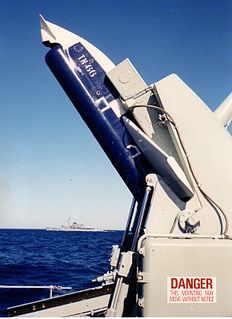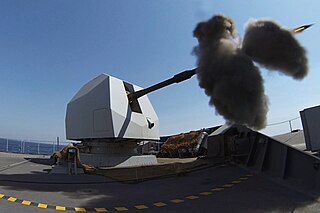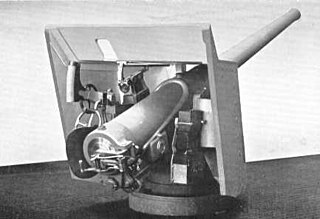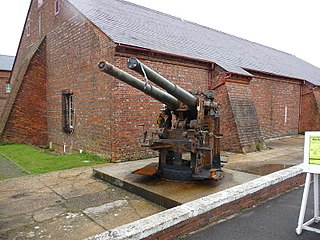Related Research Articles

HMS Bristol (D23) was a Type 82 destroyer, the only vessel of her class to be built for the Royal Navy. Bristol was intended to be the first of a class of large destroyers to escort the CVA-01 aircraft carriers projected to come into service in the early 1970s but the rest of the class and the CVA-01 carriers were cancelled as a result of the 1966 Defence White Paper which cut defence spending.

The Halifax-class frigate, also referred to as the City class, is a class of multi-role patrol frigates that have served the Royal Canadian Navy since 1992. The class is the outcome of the Canadian Patrol Frigate Project, which dates to the mid-1970s. HMCS Halifax was the first of an eventual twelve Canadian-designed and Canadian-built vessels which combine traditional anti-submarine capabilities with systems to deal with surface and air threats as well. All ships of the class are named after a major city in each province plus the cities of Ottawa and Montreal.

The Ikara missile was an Australian ship-launched anti-submarine missile, named after an Australian Aboriginal word for "throwing stick". It launched an acoustic torpedo to a range of 10 nautical miles (19 km), allowing fast-reaction attacks against submarines at ranges that would otherwise require the launching ship to close for attack, placing itself at risk. By flying to a distant target, the engagement time was dramatically shorter than provided by short-range weapons, giving the target less time to respond.

The QF 4.5 inch gun has been the standard medium-calibre naval gun used by the Royal Navy as a medium-range weapon capable of use against surface, aircraft and shore bombardment targets since 1938. This article covers the early 45-calibre family of guns up to the 1970s. For the later unrelated 55-calibre Royal Navy gun, see 4.5 inch Mark 8 naval gun.

The 4.5 inch Mark 8 is a British naval gun system which currently equips the Royal Navy's destroyers and frigates, and some British destroyers and frigates sold to other countries.

The Iowa-class battleships are the most heavily armed gunships the United States Navy has ever put to sea, due to the continual development of their onboard weaponry. The first Iowa-class ship was laid down in June 1940; in their World War II configuration, each of the Iowa-class battleships had a main battery of 16-inch (406 mm) guns that could hit targets nearly 20 statute miles (32 km) away with a variety of artillery shells designed for anti-ship or bombardment work. The secondary battery of 5-inch (127 mm) guns could hit targets nearly 9 statute miles (14 km) away with solid projectiles or proximity fuzed shells, and was effective in an anti-aircraft role as well. Each of the four battleships carried a wide array of 20 mm and 40 mm anti-aircraft guns for defense against enemy aircraft.

The QF 4.7-inch Gun Mks I, II, III, and IV were a family of British quick-firing 4.724-inch (120 mm) naval and coast defence guns of the late 1880s and 1890s that served with the navies of various countries. They were also mounted on various wheeled carriages to provide the British Army with a long range gun. They all had a barrel of 40 calibres length.

The QF 4 inch Mk V gun was a Royal Navy gun of World War I which was adapted on HA mountings to the heavy anti-aircraft role both at sea and on land, and was also used as a coast defence gun.

The QF 5.25-inch Mark I gun was the heaviest dual-purpose gun used by the Royal Navy during the Second World War. Although considered less than completely successful, it saw extensive service. 267 guns were built.

The QF 4 inch Mk XVI gun was the standard British Commonwealth naval anti-aircraft and dual-purpose gun of World War II.

The QF 4-inch gun Mk IV was the main gun on most Royal Navy and British Empire destroyers in World War I. It was introduced in 1911 as a faster-loading light gun successor to the BL 4 inch Mk VIII gun. Of the 1,141 produced, 939 were still available in 1939. Mk XII and Mk XXII variants armed many British interwar and World War II submarines.

Explosion! is the Museum of Naval Firepower situated in the former Royal Naval Armaments Depot at Priddy's Hard, in Gosport, Hampshire, England. It now forms part of the National Museum of the Royal Navy.

The 4.7 inch QF Mark IX and Mark XII were 45-calibre, 4.7-inch (120 mm) naval guns which armed the majority of Royal Navy and Commonwealth destroyers in World War II, and were exported to many countries after World War II as the destroyers they were mounted on were sold off.
The QF 14-pounder Mk I & II was a 3-inch high-velocity naval gun used to equip battleships for defence against torpedo boats. It was produced for export by Elswick Ordnance Company and Vickers, Sons and Maxim. In Royal Navy service they were modified to use the standard 12-pounder shell, while the Italian Regia Marina used the original 14-pounder shells.

This is a list of Active Royal Navy weapon systems.

The two British Devastation-class battleships of the 1870s, HMS Devastation and HMS Thunderer, were the first class of ocean-going capital ship that did not carry sails, and the first which mounted the entire main armament on top of the hull rather than inside it.

The Cannon 76/40 Model 1916 was a widely used naval gun on ships of the Royal Italian Navy during World War I and World War II. A very versatile weapon it was used as primary, secondary and tertiary armament on a number of ship classes. After being replaced aboard ships of the Royal Italian Navy it saw widespread use on land in a number of different roles such as coastal artillery, anti-aircraft gun and railroad gun during World War II.
References
- ↑ "navweaps.com WNBR_15-42_mk1".
{{cite web}}: CS1 maint: url-status (link) - ↑ "shapeways.com t1-350-hms-tiger-class-6-quot-50-15-2cm-qf-mkn5-gun-x2".
{{cite web}}: CS1 maint: url-status (link) - ↑ "navweaps.com WNBR_45-45_mk5".
{{cite web}}: CS1 maint: url-status (link) - ↑ "Navweapons.com WNBR_45-45_mk5".
{{cite web}}: CS1 maint: url-status (link) - ↑ "Mark 8 4.5 inch 55 caliber 113mm naval gun". www.seaforces.org. Retrieved 31 October 2021.
- ↑ "Tigerfish Torpedo :: Rochester Avionic Archives". rochesteravionicarchives.co.uk. Retrieved 3 November 2021.
- ↑ "Sea Skua". Weaponsystems.net. Retrieved 3 November 2021.
- ↑ "Goalkeeper Close-in Weapon System CIWS". www.seaforces.org. Retrieved 3 November 2021.
- ↑ "Invincible Class Aircraft Carriers - Naval Technology". www.naval-technology.com. Retrieved 3 November 2021.
- ↑ Glaze, Ben (24 January 2017). "Surface-to-air missile accidentally fired into Wales by Royal Navy ship". WalesOnline. Retrieved 31 October 2021.
- ↑ "Sea Cat anti-aircraft missile system | Missilery.info". en.missilery.info. Retrieved 31 October 2021.
- ↑ "Sea Dart Missile: A Parting Salute". Defense Media Network. Retrieved 31 October 2021.
- ↑ "Sea Wolf SAM Missile GWS Guided Weapon System Royal Navy". www.seaforces.org. Retrieved 31 October 2021.
- ↑ "projectile, mortar, anti-submarine, Mark NC22". Imperial War Museums. Retrieved 3 November 2021.
- ↑ "Ikara Missile". www.nepeannaval.org.au. Retrieved 3 November 2021.